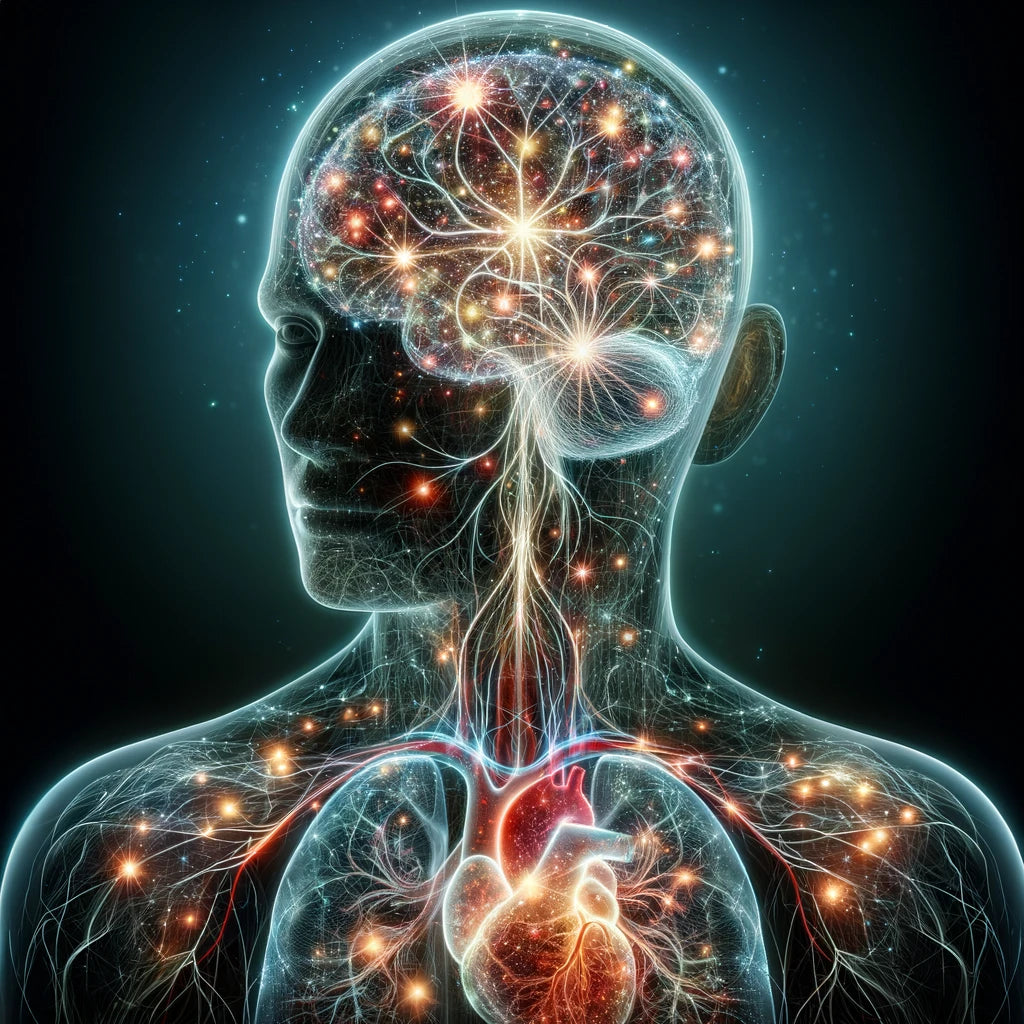
Bio-Hacking Dopamine: Navigating Our Overstimulated Society
Share
Bio-Hacking Dopamine: Navigating Our Overstimulated Society
In our fast-paced, digital-first world, we are constantly bombarded with stimuli that demand our attention and, more importantly, our dopamine. Dopamine is often dubbed the “feel-good” neurotransmitter, a chemical messenger in the brain that plays a pivotal role in how we experience pleasure, motivation, and reward. It’s the drive behind our most basic needs and sophisticated ambitions, from seeking out food to pursuing career goals. However, there’s a catch: our bodies produce a finite amount of dopamine daily, necessitating a period of regeneration. In an overstimulated society, managing this precious resource becomes crucial to our well-being.
The Dopamine Dilemma
Our modern environment, saturated with instant gratification and endless entertainment options, poses a unique challenge. Activities that spike dopamine rapidly and excessively can lead to its depletion, leaving us feeling unmotivated and unable to find pleasure in activities we know are beneficial or necessary. This phenomenon is akin to the concept of becoming a “dopamine addict,” where one constantly seeks out the quick hits that high-dopamine activities provide, often at the expense of long-term satisfaction and happiness.
Common Dopaminergic Actions in Daily Life
Several everyday activities can lead to dopamine depletion, especially when they become compulsive behaviors. Recognizing these can be the first step towards managing your dopamine levels more effectively:
1. Doomscrolling: Endlessly scrolling through social media or news feeds, even when it becomes distressingly absorbing or counterproductive.
2. Consuming High Sugar Foods: Sugary snacks and drinks provide a quick, intense dopamine rush followed by a sharp crash.
3. Excessive Screen Time: Whether it’s binge-watching series, gaming for hours, or staring at bright screens late into the night, screen time significantly impacts our dopamine levels.
4. Online Shopping: The act of browsing and purchasing online can deliver a dopamine spike with each click, especially when hunting for deals or new items.
5. Gambling and Betting: These activities provide intermittent, unpredictable rewards, leading to significant dopamine spikes.
6. Social Media Likes and Interactions: Every like, comment, or share acts as a mini-reward, triggering a small dopamine release.
Strategies for Bio-Hacking Dopamine
The goal of bio-hacking dopamine is not to eliminate these activities altogether but to find a balance that allows for dopamine regeneration and sustains our overall motivation and satisfaction. Here are some strategies to consider:
• Moderation and Mindfulness: Be conscious of your engagement in high-dopamine activities and set limits to avoid excessive consumption.
• Digital Detox: Allocate specific times of the day or week where you disconnect from digital devices and engage in low-dopamine activities like reading, meditating, or spending time in nature.
• Diverse Interests: Cultivate hobbies and interests that provide a steady, more sustainable release of dopamine. Activities like exercising, learning a new skill, or participating in community service can be incredibly rewarding over time.
• Healthy Eating: Opt for a balanced diet rich in nutrients that support dopamine production, such as foods high in tyrosine (e.g., almonds, bananas, avocados).
• Quality Sleep: Ensure you’re getting enough quality sleep each night, as sleep plays a crucial role in dopamine regulation.
In conclusion, while dopamine plays a vital role in driving our behavior towards goals and rewards, the key to harnessing its power lies in balance and moderation. By being mindful of our daily activities and their impact on our dopamine levels, we can bio-hack our way to a more motivated, fulfilling life, even in our overstimulated society.
In our fast-paced, digital-first world, we are constantly bombarded with stimuli that demand our attention and, more importantly, our dopamine. Dopamine is often dubbed the “feel-good” neurotransmitter, a chemical messenger in the brain that plays a pivotal role in how we experience pleasure, motivation, and reward. It’s the drive behind our most basic needs and sophisticated ambitions, from seeking out food to pursuing career goals. However, there’s a catch: our bodies produce a finite amount of dopamine daily, necessitating a period of regeneration. In an overstimulated society, managing this precious resource becomes crucial to our well-being.
The Dopamine Dilemma
Our modern environment, saturated with instant gratification and endless entertainment options, poses a unique challenge. Activities that spike dopamine rapidly and excessively can lead to its depletion, leaving us feeling unmotivated and unable to find pleasure in activities we know are beneficial or necessary. This phenomenon is akin to the concept of becoming a “dopamine addict,” where one constantly seeks out the quick hits that high-dopamine activities provide, often at the expense of long-term satisfaction and happiness.
Common Dopaminergic Actions in Daily Life
Several everyday activities can lead to dopamine depletion, especially when they become compulsive behaviors. Recognizing these can be the first step towards managing your dopamine levels more effectively:
1. Doomscrolling: Endlessly scrolling through social media or news feeds, even when it becomes distressingly absorbing or counterproductive.
2. Consuming High Sugar Foods: Sugary snacks and drinks provide a quick, intense dopamine rush followed by a sharp crash.
3. Excessive Screen Time: Whether it’s binge-watching series, gaming for hours, or staring at bright screens late into the night, screen time significantly impacts our dopamine levels.
4. Online Shopping: The act of browsing and purchasing online can deliver a dopamine spike with each click, especially when hunting for deals or new items.
5. Gambling and Betting: These activities provide intermittent, unpredictable rewards, leading to significant dopamine spikes.
6. Social Media Likes and Interactions: Every like, comment, or share acts as a mini-reward, triggering a small dopamine release.
Strategies for Bio-Hacking Dopamine
The goal of bio-hacking dopamine is not to eliminate these activities altogether but to find a balance that allows for dopamine regeneration and sustains our overall motivation and satisfaction. Here are some strategies to consider:
• Moderation and Mindfulness: Be conscious of your engagement in high-dopamine activities and set limits to avoid excessive consumption.
• Digital Detox: Allocate specific times of the day or week where you disconnect from digital devices and engage in low-dopamine activities like reading, meditating, or spending time in nature.
• Diverse Interests: Cultivate hobbies and interests that provide a steady, more sustainable release of dopamine. Activities like exercising, learning a new skill, or participating in community service can be incredibly rewarding over time.
• Healthy Eating: Opt for a balanced diet rich in nutrients that support dopamine production, such as foods high in tyrosine (e.g., almonds, bananas, avocados).
• Quality Sleep: Ensure you’re getting enough quality sleep each night, as sleep plays a crucial role in dopamine regulation.
In conclusion, while dopamine plays a vital role in driving our behavior towards goals and rewards, the key to harnessing its power lies in balance and moderation. By being mindful of our daily activities and their impact on our dopamine levels, we can bio-hack our way to a more motivated, fulfilling life, even in our overstimulated society.
